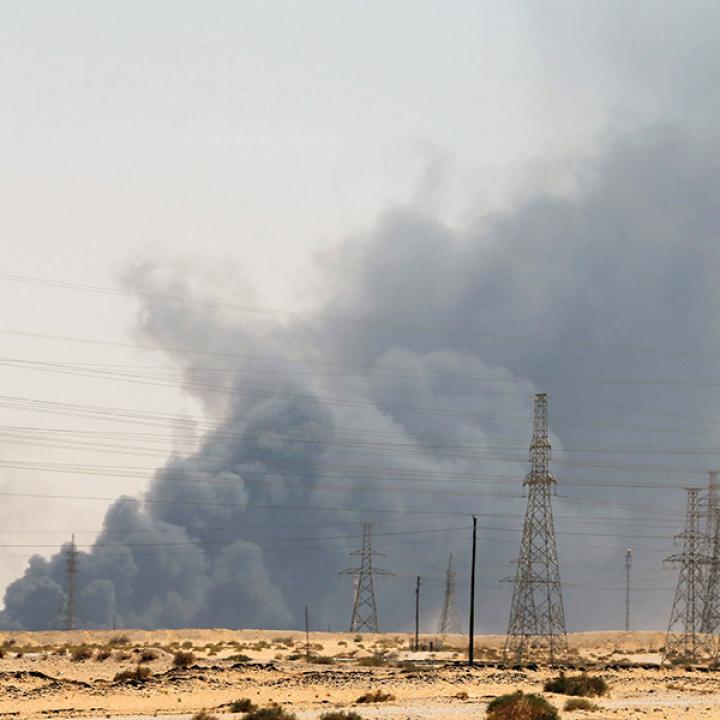
- Policy Analysis
- Fikra Forum
Iran and Saudi Arabia: Imagining a Path Towards Rapprochement

Since Saudi Arabia broke ties with Iran following the 2016 ransacking and torching of the Saudi Embassy in Tehran, tensions have soared and the potential for a full-fledged military confrontation has become virtually unavoidable. With the September attack on Saudi’s oil fields in Abqaiq and the very real threat of an overt conflict, it is imperative that both sides find channels for rapprochement before the situation spirals further. At minimum, the two parties should agree on the basic principles of maintaining stability and providing for the needs of their people.
During the past few months, there have been signs of a potential opening for easing tensions. Iranian state news agency (IRNA) reported that on December 3, Hassan Rouhani remarked that “From Iran's points of view, there is no problem in developing ties with neighbors and resuming relations with Saudi Arabia."
This is not the first time an Iranian public figure has expressed a potential interest in reestablishing relations with Saudi Arabia. Foreign Minister Mohammad Javad Zarif has been making similar overtures for month, and was quoted by the Islamic Republic of Iran Broadcasting (IRIB) agency in early October as alluding to the possibility of resuming diplomatic relations between the two countries. Then, Zarif stated that if Saudi Arabia pursue regional issues at the negotiating table, they will certainly have “the Islamic Republic along with them.” Saudi Minister of State for Foreign Affairs Adel al-Jubeir responded the following Tuesday, stating “The ministry of foreign affairs is always ready to cooperate with our neighbor,” adding that “de-escalation should come from the party that is escalating.”
While the aforementioned public statements, along with their caveat, should be regarded with skepticism, they do suggest at least a basis for dialogue between the two states that could lead to a potential rapprochement. The path towards reconciliation remains long and fraught with obstacles, yet emphasizing potential paths towards such an outcome is crucial in order to encourage such an event.
Saudi Arabia’s policy towards Iran has long been driven by its view of the threat Iran poses to the Shia community in the region. Iran’s attempts to engage the Shiite factions in Arab countries, especially the GCC, have been seen as particularly dangerous and violations of their sovereignty. However, with Iran’s ‘shia crescent’ strategy backfiring in Lebanon and Iraq, and with Iran’s brutal suppression of domestic protests, the Islamic Republic may now be particularly inclined to reconsider the viability of this strategy in the GCC countries.
Instead, it would benefit both parties to work towards a diplomatic “stability-for-stability” deal that could prove mutually beneficial for these sovereign states. The “stability-for-stability” deal should include trust-building measures to safeguard future relations, and push Iran in particular to abandon its aggressive ideological agenda it has relied on to influence the Arab World over the past forty years.
With the case of any potential rapprochement, the devil is in the details. Initial mid-level meetings are more likely to be successful when conducted in a third-party country, such as Pakistan, to promote a sense of neutrality. Countries within the EU in particular present a relatively neutral option, especially if EU leadership can be present to mediate the discussion. Furthermore, any agreement should also be supported and supervised by international bodies, such as United Nations.
The historical enmity between the two states also requires a cultural component for rapprochement at the state level. To this end, Saudi Arabia and Iran should establish bilateral meetings between senior officials, scholars, and public figures to encourage dialogue and enrich the bonds of such groups within the overlapping sectors of society. The relationships formed through these Saudi-Iranian joint meetings act as a proactive step in preventing future crises by acting as a bridge between citizens and decision-makers. The society will relay public grievances and recommend informed solutions based on academic theories, international standards, and regional interests––overall promoting a healthier political dialogue.
Outside of bilateral agreements, broader efforts at regional cooperation may provide a window for thawing tensions. During the September meeting of the UN general assembly, Rouhani released a regional peace proposal for stability in the gulf and the Strait of Hormuz called Coalition for HOPE. While further details of the plan have not yet emerged, Rouhani’s emphasis on describing the plan as a way to rid the region of foreign––more specifically U.S.—intervention may suggest that Iran could be open to a similar type of organization under international auspices if the United States is not involved.
In principle, the idea of developing a regional body centered around the Strait of Hormuz is one with much promise. However, such a body cannot be led exclusively by Iran. Rather, such a body could emerge through establishment of a Regional Court on the affairs of Gulf States and Iran (G6+1), with exclusive membership for regional countries and under the supervision of international bodies, such as the United Nations.
Looking further into the future, this Regional Court might also oversee a regional Joint Police Force (REJPOF), which will monitor and regulate cross-border criminal networks of member states—a key point of contention in maritime traffic along the Strait of Hormuz. A joint police force of this scale will bolster the internal and external security capacity of participating nations. Moreover, the Court must be committed to resolving regional conflicts through collective work on economic, social, and political levels.
Though these steps are merely words on paper, it is important to begin discussing potential rational maneuvers available to two states to deescalate the tensions currently at the forefront of their relationship. Moreover, any attempt to engage in peaceful dialogue is likely to give either country a sense of greater credibility vis-à-vis the international community, which both states sorely lack. And if these two adversaries can find common ground, it may lend hope in extinguishing other flames ignited by years of surrounding regional conflicts.



